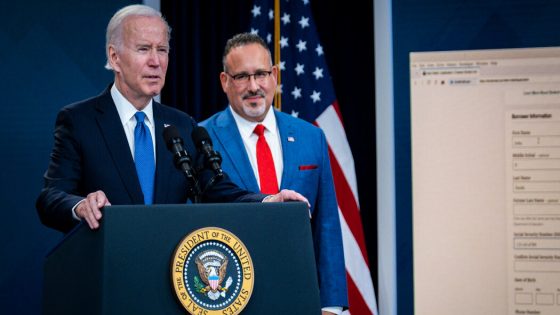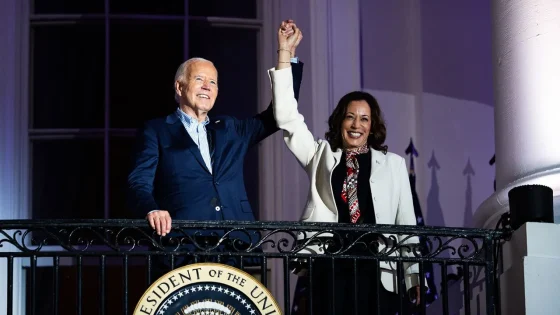The Biden administration issued new rules on Friday cementing protections for L.G.B.T.Q. students under federal law and reversing a number of Trump-era policies that dictated how schools should respond to cases of alleged sexual misconduct in K-12 schools and college campuses.
The new rules, which take effect on Aug. 1, effectively broadened the scope of Title IX, the 1972 law prohibiting sex discrimination in educational programs that receive federal funding. They extend the law’s reach to prohibit discrimination and harassment based on sexual orientation and gender identity, and widen the range of sexual harassment complaints that schools will be responsible for investigating.
“These regulations make it crystal clear that everyone can access schools that are safe, welcoming and that respect their rights,” Miguel A. Cardona, the education secretary, said in a call with reporters.
The rules deliver on a key campaign promise for Mr. Biden, who declared he would put a “quick end” to the Trump-era Title IX rules and faced mounting pressure from Democrats and civil rights leaders to do so.
The release of the updated rules, after two delays, came as Mr. Biden is in the thick of his re-election bid and is trying to galvanize key electoral constituencies.
Through the new regulations, the administration moved to include students in its interpretation of Bostock v. Clayton County, the landmark 2020 Supreme Court case in which the court ruled that the Civil Rights Act of 1964 protects gay and transgender workers from workplace discrimination. The Trump administration held that transgender students were not protected under federal laws, including after the Bostock ruling.
In a statement, Betsy DeVos, who served as Mr. Trump’s education secretary, criticized what she called a “radical rewrite” of the law, asserting that it was an “endeavor born entirely of progressive politics, not sound policy.”
Ms. DeVos said the inclusion of transgender students in the law gutted decades of protections and opportunities for women. She added that the Biden administration also “seeks to U-turn to the bad old days where sexual misconduct was sent to campus kangaroo courts, not resolved in a way that actually sought justice.”
While the regulations released on Friday contained considerably stronger protections for L.G.B.T.Q. students, the administration steered clear of the lightning-rod issue of whether transgender students should be able to play on school sports teams corresponding to their gender identity.
The administration stressed that while, writ large, exclusion based on gender identity violated Title IX, the new regulations did not extend to single-sex living facilities or sports teams. The Education Department is pursuing a second rule dealing with sex-related eligibility for male and female sports teams. The rule-making process has drawn more than 150,000 comments.
Under the revisions announced on Friday, instances where transgender students are subjected to a “hostile environment” through bullying or harassment, or face unequal treatment and exclusion in programs or facilities based on their gender identity, could trigger an investigation by the department’s Office for Civil Rights.
Instances where students are repeatedly referred to by a name or pronoun other than one they have chosen could also be considered harassment on a case-by-case basis.
“This is a bold and important statement that transgender and nonbinary students belong, in their schools and in their communities,” said Olivia Hunt, the policy director for the National Center for Transgender Equality.
The regulations appeared certain to draw to legal challenges from conservative groups.
May Mailman, the director of the Independent Women’s Law Center, said in a statement that the group planned to sue the administration. She said it was clear that the statute barring discrimination on the basis of “sex” means “binary and biological.”
“The unlawful omnibus regulation reimagines Title IX to permit the invasion of women’s spaces and the reduction of women’s rights in the name of elevating protections for ‘gender identity,’ which is contrary to the text and purpose of Title IX,” she said.
The existing rules, which took effect under Mr. Trump in 2020, were the first time that sexual assault provisions were codified under Title IX. They bolstered due process rights of accused students, relieved schools of some legal liabilities and laid out rigid parameters for how schools should conduct impartial investigations.
They were a sharp departure from the Obama administration’s interpretation of the law, which came in the form of unenforceable guidance documents directing schools to ramp up investigations into sexual assault complaints under the threat of losing federal funding. Scores of students who had been accused of sexual assault went on to win court cases against their colleges for violating their due process rights under the guidelines.
The Biden administration’s rules struck a balance between the Obama and Trump administration’s goals. Taken together, the regulation largely provides more flexibility for how schools conduct investigations, which advocates and schools have long lobbied for.
Catherine E. Lhamon, the head of the department’s Office for Civil Rights who also held the job under President Barack Obama, called the new rules the “most comprehensive coverage under Title IX since the regulations were first promulgated in 1975.”
They replaced a narrower definition of sex-based harassment adopted under the Trump administration with one that would include a wider range of conduct. And they reversed a requirement that schools investigate only incidents alleged to have occurred on their campuses or in their programs.
Still, some key provisions in the Trump-era rules were preserved, including one allowing informal resolutions and another prohibiting penalties against students until after an investigation.
Among the most anticipated changes was the undoing of a provision that required in-person, or so-called live hearings, in which students accused of sexual misconduct, or their lawyers, could confront and question accusers in a courtroom-like setting.
The new rules allow in-person hearings, but do not mandate them. They also require a process through which a decision maker could assess a party or witness’s credibility, including posing questions from the opposing party.
“The new regulations put an end to unfair and traumatic grievance procedures that favor harassers,” Kel O’Hara, a senior attorney at Equal Rights Advocates. “No longer will student survivors be subjected to processes that prioritize the interests of their perpetrators over their own well being and safety.”
The new rules also allow room for schools to use a “preponderance of evidence” standard, a lower burden of proof than the DeVos-era rules encouraged, through which administrators need only to determine whether it was more likely than not that sexual misconduct had occurred.
The renewed push for that standard drew criticism from legal groups who said the rule stripped away hard-won protections against flawed findings.
“When you are dealing with accusations of really one of the most heinous crimes that a person can commit — sexual assault — it’s not enough to say, ‘50 percent and a feather,’ before you brand someone guilty of this repulsive crime,” said Will Creeley, the legal director of the Foundation for Individual Rights and Expression.
The changes concluded a three-year process in which the department received 240,000 public comments. The rules also strengthen protections for pregnant students, requiring accommodations such as a bigger desk or ensuring access to elevators and prohibiting exclusion from activities based on additional needs.
Title IX was designed to end discrimination based on sex in educational programs or activities at all institutions receiving federal financial assistance, beginning with sports programs and other spaces previously dominated by male students.
The effects of the original law have been pronounced. Far beyond the impact on school programs like sports teams, many educators credit Title IX with setting the stage for academic parity today. Female college students routinely outnumber male students on campus and have become more likely than men of the same age to graduate with a four-year degree.
But since its inception, Title IX has also become a powerful vehicle through which past administrations have sought to steer schools to respond to the dynamic and diverse nature of schools and universities.
While civil rights groups were disappointed that some ambiguity remains for the L.G.B.T.Q. students and their families, the new rules were widely praised for taking a stand at a time when education debates are reminiscent to the backlash after the Supreme Court ordered schools to integrate.
More than 20 states have passed laws that broadly prohibit anyone assigned male at birth from playing on girls’ and women’s sports teams or participating in scholastic athletic programs, while 10 states have laws barring transgender people from using bathrooms based on their gender identity.
“Some adults are showing up and saying, ‘I’m going to make school harder for children,” said Liz King, senior program director of the education equity program at the Leadership Conference on Civil and Human Rights. “It’s an incredibly important rule, at an incredibly important moment.”
Schools will have to cram over the summer to implement the rules, which will require a retraining staff and overhauling procedures they implemented only four years ago.
Ted Mitchell, the president of the American Council on Education, which represents more than 1,700 colleges and universities, said in a statement that while the group welcomed the changes in the new rule, the timeline “disregards the difficulties inherent in making these changes on our nation’s campuses in such a short period of time.”
“After years of constant churn in Title IX guidance and regulations,” Mr. Mitchell said, “we hope for the sake of students and institutions that there will be more stability and consistency in the requirements going forward.”
Source Agencies




